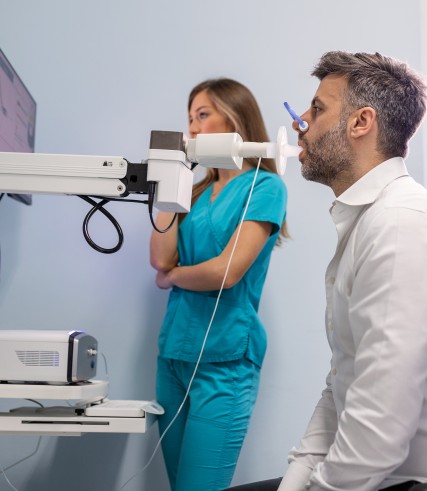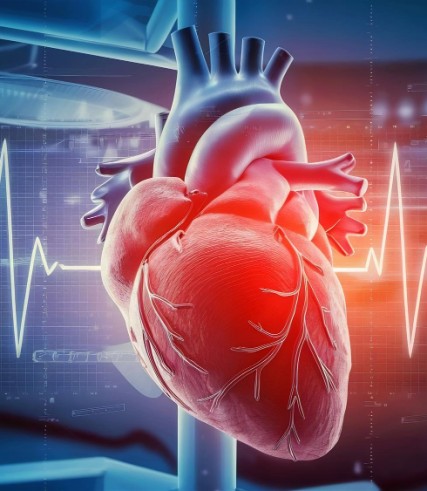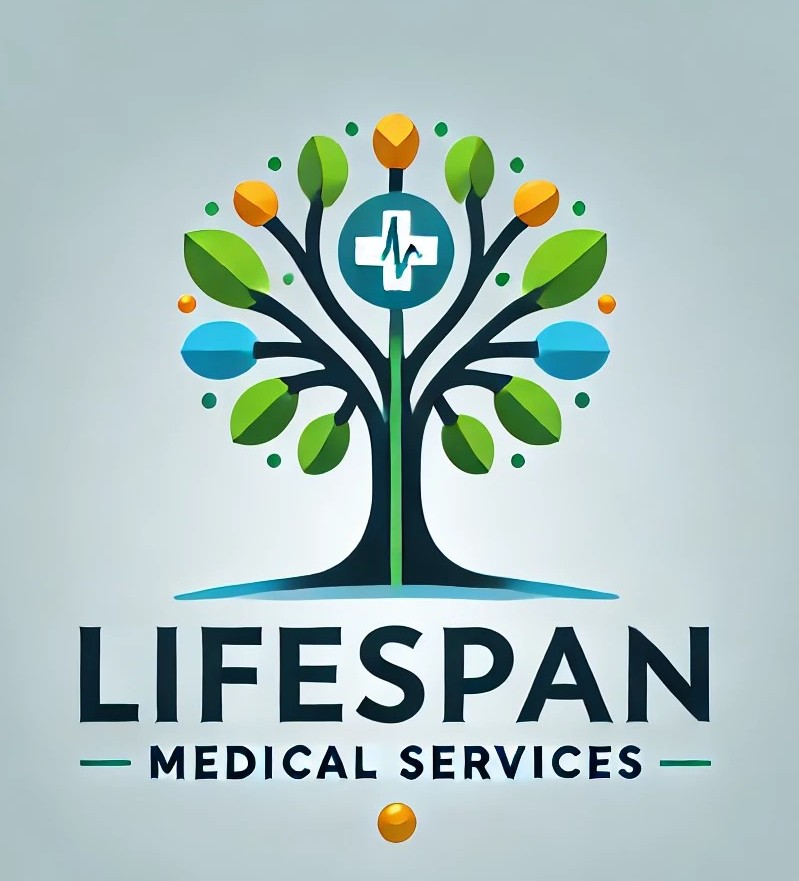ABOUT LIFESPAN


Lifespan Medical Services is a well-established medical practice that has been serving the Delaware community for over 17 years. Specializing in adult and geriatric care, the practice offers comprehensive primary care services to individuals aged 18 and older, with a strong emphasis on senior care and chronic disease management. Our goal is to provide personalized, high-quality healthcare, ensuring patients' well-being as they navigate through all stages of adulthood and aging.
Services Offered:
- Primary Care
- Chronic Disease Management
- Geriatric Care
- Annual Wellness Visits
- Vaccinations
- Telemedicine
Our Services

Chronic Disease Management

Medicare annual well Visits

Physical Exams

Preoperative Evaluations

Transitional Care Management

Telemedicine Visits

Memory Evaluation

Advance Health Care Directives

Minor Procedures

Joint and Soft-tissue injections

EKGs

Spirometry

Immunizations
Our comprehensive chronic disease management service helps you take control of long-term conditions like diabetes, hypertension, and asthma through personalized care plans, regular monitoring, and ongoing support for better health outcomes.
Stay proactive about your health with our Medicare Annual Wellness Visits, offering a detailed review of your current health status, preventive care, and personalized wellness planning to keep you on track throughout the year.
Our thorough physical exams provide a complete health assessment, ensuring early detection of potential issues and helping you maintain your well-being with tailored advice on lifestyle, fitness, and nutrition.
We provide detailed preoperative evaluations to assess your health and readiness for surgery, ensuring that all necessary precautions are in place for a safe and successful procedure.
Our transitional care management services support you as you move from hospital to home, ensuring a smooth recovery process with coordinated care, follow-up appointments, and medication management.
Connect with our healthcare professionals from the comfort of your home through our convenient telemedicine visits, offering quality care for a variety of medical concerns without the need for in-person appointments.
Our memory evaluation services assess cognitive function, providing early detection and personalized care for memory-related concerns, including Alzheimer's and other forms of dementia.
We assist in creating advance health care directives to ensure your healthcare wishes are clearly communicated and respected in situations where you may be unable to make decisions for yourself.
We offer a range of minor procedures, including wound care, lesion removal, and skin biopsies, performed with precision and care in our comfortable, state-of-the-art facilities.
Our EKG services provide accurate assessments of your heart’s electrical activity, helping detect heart conditions early so that timely interventions can be made for better cardiovascular health.
Our spirometry tests measure lung function, assisting in the diagnosis and management of respiratory conditions like asthma, COPD, and other lung-related issues.
Protect yourself and your loved ones with our immunization services, offering vaccines for flu, pneumonia, and other preventable diseases to keep you healthy year-round.
We provide joint and soft-tissue injections to relieve pain and inflammation in conditions such as arthritis, tendonitis, and sports injuries, helping you move with ease again.
Patient Information

HYPERTENSION
Hypertension, commonly known as high blood pressure, is a medical condition characterized by elevated blood pressure levels persistently exceeding the normal range. Blood pressure is the force exerted by blood against the walls of arteries as the heart pumps it throughout the body. It is measured in millimeters of mercury (mmHg) and consists of two values: systolic pressure (the pressure when the heart contracts) and diastolic pressure (the pressure when the heart is at rest between beats).
Normal blood pressure is typically defined as 120/80 mmHg. Hypertension is diagnosed when blood pressure consistently exceeds 130/80 mmHg. It is often referred to as a "silent killer" because it rarely presents noticeable symptoms, yet it can lead to severe health complications if left untreated.
Read More
DIABETES
Diabetes is a chronic metabolic disorder characterized by elevated levels of blood glucose, commonly referred to as blood sugar. The condition arises when the pancreas fails to produce enough insulin or when the body cannot effectively use the insulin it produces. Insulin is a hormone crucial for regulating blood sugar levels, allowing cells to absorb and utilize glucose for energy.
There are two main types of diabetes
- Type 1 Diabetes
- Type 2 Diabetes

CORONARY ARTERY DISEASE
Coronary Artery Disease (CAD) is a prevalent and potentially serious cardiovascular condition characterized by the accumulation of fatty deposits, cholesterol, and other substances within the coronary arteries. These arteries supply oxygen-rich blood to the heart muscle, and when they become narrowed or blocked due to atherosclerosis, the heart's blood supply is compromised.
Atherosclerosis, the primary cause of CAD, involves the gradual buildup of plaque on the inner walls of the coronary arteries. Over time, this plaque can harden and narrow the arteries, reducing blood flow to the heart. The reduced blood supply may lead to angina (chest pain or discomfort) and, in severe cases, result in myocardial infarction (heart attack).
Read More
COPD
Chronic Obstructive Pulmonary Disease (COPD) is a progressive and incurable respiratory condition characterized by persistent airflow limitation. It encompasses a group of lung diseases, including chronic bronchitis and emphysema, often caused by long-term exposure to irritating gases or particulate matter, most commonly from cigarette smoke. Other factors such as air pollution, occupational dust and chemicals, and genetic predisposition can also contribute to the development of COPD.
The main feature of COPD is the obstruction of airflow in and out of the lungs, primarily due to the narrowing of the airways and destruction of lung tissue. Symptoms typically include persistent cough, sputum production, shortness of breath, and wheezing. These symptoms can progressively worsen over time, leading to significant impairment of daily activities and a reduced quality of life.
Read More
CHRONIC KIDNEY DISEASE
Chronic Kidney Disease (CKD) is a progressive condition characterized by the gradual loss of kidney function over time. The kidneys play a crucial role in filtering waste products and excess fluids from the blood, maintaining electrolyte balance, and producing hormones that regulate blood pressure and red blood cell production. When the kidneys are impaired, these functions become compromised.
CKD is often asymptomatic in its early stages, making it challenging to detect until significant damage has occurred. Common causes of CKD include diabetes, hypertension, glomerulonephritis, and polycystic kidney disease. Other factors, such as aging, family history, and certain medications, can also contribute to the development of CKD.
Read More
HYPOTHYROIDISM
Hypothyroidism is a medical condition characterized by an underactive thyroid gland, which fails to produce sufficient thyroid hormones to meet the body's needs. The thyroid gland, a small butterfly-shaped organ located in the front of the neck, plays a crucial role in regulating metabolism and energy production by releasing hormones, primarily thyroxine (T4) and triiodothyronine (T3).
Common causes of hypothyroidism include autoimmune thyroiditis (Hashimoto's disease), where the immune system mistakenly attacks the thyroid gland, leading to inflammation and impaired function. Other factors may include thyroid surgery, radiation therapy, certain medications, congenital thyroid abnormalities, or iodine deficiency.
Read More
OBESITY
Obesity is a chronic health condition characterized by an excessive accumulation of body fat, leading to negative effects on an individual's well-being. It is typically measured by body mass index (BMI), with a BMI of 30 or higher considered obese. The prevalence of obesity has risen significantly worldwide, presenting a major public health challenge.
Several factors contribute to obesity, including genetics, environmental influences, sedentary lifestyles, and poor dietary habits. Consuming a diet high in processed foods, sugars, and fats, coupled with a lack of physical activity, can contribute to weight gain and obesity. Additionally, genetic factors may predispose certain individuals to obesity, although lifestyle choices play a significant role.
Read More
TOBACCO USE AND SMOKING CESSATION
Smoking cessation refers to the process of quitting tobacco smoking and overcoming nicotine addiction. It is a crucial health goal as smoking is a leading cause of preventable diseases and premature death worldwide. The decision to quit smoking often stems from a desire to improve one's health, reduce the risk of chronic diseases, and enhance overall well-being.
Quitting smoking involves both physical and psychological challenges, primarily due to nicotine dependence. Nicotine, a highly addictive substance in tobacco, creates a physical addiction that can result in withdrawal symptoms when attempting to quit. Common withdrawal symptoms include irritability, cravings, anxiety, and difficulty concentrating.
Read More
ALCOHOL ABUSE
Alcohol abuse is a pervasive and serious public health issue characterized by the excessive and harmful consumption of alcoholic beverages. It encompasses a range of problematic behaviors and consequences resulting from the misuse of alcohol. While moderate alcohol consumption may not pose significant risks, excessive and persistent abuse can lead to severe physical, mental, and social consequences.
Physiologically, alcohol abuse can have detrimental effects on various organs and systems in the body, including the liver, cardiovascular system, and the central nervous system. Chronic alcohol abuse may contribute to liver cirrhosis, pancreatitis, cardiovascular diseases, and neurological disorders.
Read More
